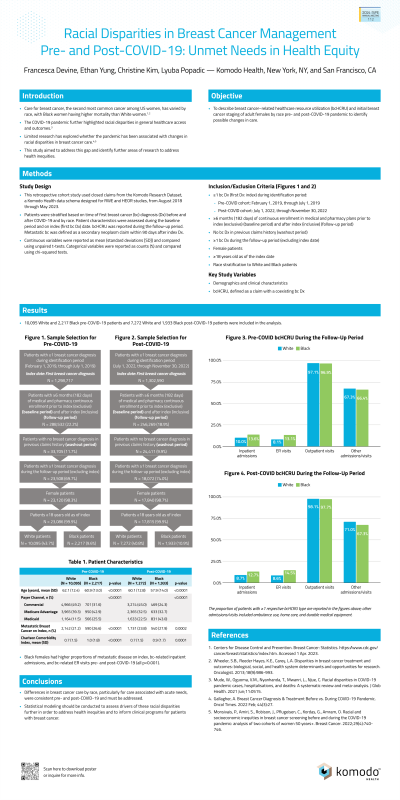Health Equity
Session: Poster Session C
(112) Racial Disparities in Breast Cancer Management Pre- and Post-COVID-19: Unmet Needs in Health Equity
Wednesday, August 28, 2024
8:00 AM - 1:30 PM CEST
Location: Convention Hall II


Francesca Devine
Komodo Health, United States
- EY
Ethan Yung
Komodo Health, United States
- CK
Christine Kim
Komodo Health, United States

Lyuba Popadic, BA
Manager
Komodo Health, United States
Co-Author(s)
Presenting Author(s)
Background: The COVID-19 pandemic highlighted the systemic racial inequities in the US healthcare system. Racial disparities in breast cancer (BC) management existed prior to the pandemic, but minimal research has explored whether the pandemic was associated with changes in BC care.
Objectives: To describe BC-related healthcare resource utilization (BC-HCRU) and BC staging before and after COVID-19 among White and Black adult women.
Methods: This retrospective claims analysis described patient characteristics, payer type, BC-HCRU, and staging among White and Black women at least 18 years old from the Komodo Research Dataset from August 2018 through May 2023. Women were required to have continuous enrollment in medical and pharmacy plans for at least 6 months before (baseline) and after (follow-up) their first breast cancer diagnosis (index) and a second breast cancer diagnosis during follow-up. Women were designated into pre-COVID-19 (pre) (February-July 2019) or post-COVID-19 (post) (July-November 2022) cohorts based on their index dates. BC-HCRU was defined as a medical encounter with BC diagnosis in any position. Descriptive statistics were used to summarize outcomes by race and cohort.
Results: 10,095 White and 2,217 Black pre patients and 7,272 White and 1,933 Black post patients were included (mean age (SD) (years): pre: 62.1 (12.4) and 60.9 (13.0); post: 60.1 (12.8), and 57.9 (14.0), respectively). The proportion with commercial insurance was higher among White than Black women both pre and post (pre: 49.2% and 31.6%; post: 45.0% and 24.3%). The proportion with metastatic BC, defined as a secondary neoplasm claim within 90 days of index date, was lower among White than Black women both pre and post (pre: 21.2% and 26.6%; post: 23.8% and 27.9%). The proportion with an BC-related ER visit or inpatient admission was higher among White than Black women both pre and post, suggesting consistent greater acute BC care needs for Black women (pre: 18.1% and 26.7%; post: 17.3% and 27.2%).
Conclusions: Disparities in BC care between White and Black women remained pre- and post-COVID-19. Additional research should be conducted to identify and address factors driving these disparities, including socioeconomic status and access to care. Public health programs for BC prevention and management and real-world clinical practice should consider these differences in BC care to promote health equity for all races and ethnicities.
Objectives: To describe BC-related healthcare resource utilization (BC-HCRU) and BC staging before and after COVID-19 among White and Black adult women.
Methods: This retrospective claims analysis described patient characteristics, payer type, BC-HCRU, and staging among White and Black women at least 18 years old from the Komodo Research Dataset from August 2018 through May 2023. Women were required to have continuous enrollment in medical and pharmacy plans for at least 6 months before (baseline) and after (follow-up) their first breast cancer diagnosis (index) and a second breast cancer diagnosis during follow-up. Women were designated into pre-COVID-19 (pre) (February-July 2019) or post-COVID-19 (post) (July-November 2022) cohorts based on their index dates. BC-HCRU was defined as a medical encounter with BC diagnosis in any position. Descriptive statistics were used to summarize outcomes by race and cohort.
Results: 10,095 White and 2,217 Black pre patients and 7,272 White and 1,933 Black post patients were included (mean age (SD) (years): pre: 62.1 (12.4) and 60.9 (13.0); post: 60.1 (12.8), and 57.9 (14.0), respectively). The proportion with commercial insurance was higher among White than Black women both pre and post (pre: 49.2% and 31.6%; post: 45.0% and 24.3%). The proportion with metastatic BC, defined as a secondary neoplasm claim within 90 days of index date, was lower among White than Black women both pre and post (pre: 21.2% and 26.6%; post: 23.8% and 27.9%). The proportion with an BC-related ER visit or inpatient admission was higher among White than Black women both pre and post, suggesting consistent greater acute BC care needs for Black women (pre: 18.1% and 26.7%; post: 17.3% and 27.2%).
Conclusions: Disparities in BC care between White and Black women remained pre- and post-COVID-19. Additional research should be conducted to identify and address factors driving these disparities, including socioeconomic status and access to care. Public health programs for BC prevention and management and real-world clinical practice should consider these differences in BC care to promote health equity for all races and ethnicities.
